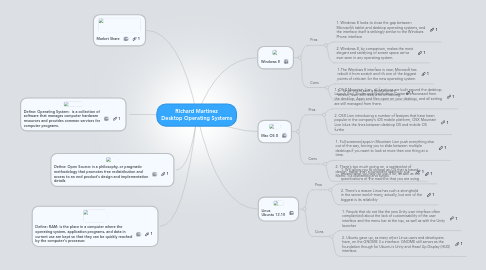
1. Define: Operating System: is a collection of software that manages computer hardware resources and provides common services for computer programs.
2. Define: Open Source: is a philosophy, or pragmatic methodology that promotes free redistribution and access to an end product's design and implementation details
3. Define: RAM: is the place in a computer where the operating system, application programs, and data in current use are kept so that they can be quickly reached by the computer's processor.
4. Market Share
5. Windows 8
5.1. Pros
5.1.1. 1. Windows 8 looks to close the gap between Microsoft’s tablet and desktop operating systems, and the interface itself is strikingly similar to the Windows Phone interface
5.1.2. 2. Windows 8, by comparison, makes the most elegant and satisfying of screen space we've ever seen in any operating system.
5.2. Cons
5.2.1. 1.The Windows 8 interface is new; Microsoft has rebuilt it from scratch and it’s one of the biggest points of criticism for the new operating system
5.2.2. 2. Since this is such a revolutionary version, user will need a lot of training.
6. Mac OS X
6.1. Pros
6.1.1. 1. OS X Mountain Lion, all functions are built around the desktop; Launch Pad, Finder and Notification Center are accessed from the desktop; Apps and files open on your desktop, and all setting are still managed from there.
6.1.2. 2. OSX Lion introducing a number of features that have been popular in the company’s iOS mobile platform, OSX Mountain Lion blurs the lines between desktop OS and mobile OS furthe
6.2. Cons
6.2.1. 1. Full screened apps in Mountain Lion push everything else out of the way, forcing you to slide between multiple desktops if you want to look at more than one thing at a time.
6.2.2. 2. There's too much going on, a scattershot of design, rather than a consistent ideology a la Metro. It's distracting and turgid.
7. Linux Ubuntu 12.10
7.1. Pros
7.1.1. 1. Will allow you to choose an OS that is based around what you wish to use it for, as well as the specifications of the machine that you are using
7.1.2. 2. There's a reason Linux has such a stronghold in the server world--many, actually, but one of the biggest is its reliability
7.2. Cons
7.2.1. 1. People that do not like the new Unity user interface often complain(ed) about the lack of customisability of the user interface and the menu bar at the top, as well as with the Unity launcher
7.2.2. 2. Ubuntu gave up, as many other Linux users and developers have, on the GNOME 3.x interface. GNOME still serves as the foundation though for Ubuntu's Unity and Head Up Display (HUD) interface.
